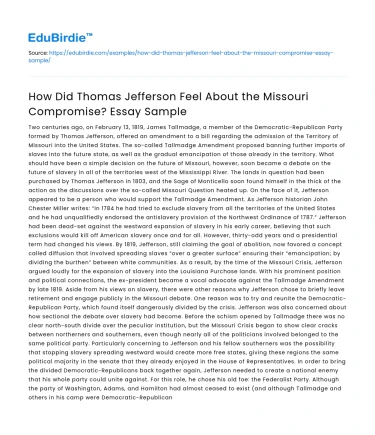Two centuries ago, on February 13, 1819, James Tallmadge, a member of the Democratic-Republican Party formed by Thomas Jefferson, offered an amendment to a bill regarding the admission of the Territory of Missouri into the United States. The so-called Tallmadge Amendment proposed banning further imports of slaves into the future state, as well as the gradual emancipation of those already in the territory. What should have been a simple decision on the future of Missouri, however, soon became a debate on the future of slavery in all of the territories west of the Mississippi River. The lands in question had been purchased by Thomas Jefferson in 1803, and the Sage of Monticello soon found himself in the thick of the action as the discussions over the so-called Missouri Question heated up.
On the face of it, Jefferson appeared to be a person who would support the Tallmadge Amendment. As Jefferson historian John Chester Miller writes: “In 1784 he had tried to exclude slavery from all the territories of the United States and he had unqualifiedly endorsed the antislavery provision of the Northwest Ordinance of 1787.” Jefferson had been dead-set against the westward expansion of slavery in his early career, believing that such exclusions would kill off American slavery once and for all. However, thirty-odd years and a presidential term had changed his views. By 1819, Jefferson, still claiming the goal of abolition, now favored a concept called diffusion that involved spreading slaves “over a greater surface” ensuring their “emancipation; by dividing the burthen” between white communities. As a result, by the time of the Missouri Crisis, Jefferson argued loudly for the expansion of slavery into the Louisiana Purchase lands. With his prominent position and political connections, the ex-president became a vocal advocate against the Tallmadge Amendment by late 1819.
Aside from his views on slavery, there were other reasons why Jefferson chose to briefly leave retirement and engage publicly in the Missouri debate. One reason was to try and reunite the Democratic-Republican Party, which found itself dangerously divided by the crisis. Jefferson was also concerned about how sectional the debate over slavery had become. Before the schism opened by Tallmadge there was no clear north-south divide over the peculiar institution, but the Missouri Crisis began to show clear cracks between northerners and southerners, even though nearly all of the politicians involved belonged to the same political party. Particularly concerning to Jefferson and his fellow southerners was the possibility that stopping slavery spreading westward would create more free states, giving these regions the same political majority in the senate that they already enjoyed in the House of Representatives.
In order to bring the divided Democratic-Republicans back together again, Jefferson needed to create a national enemy that his whole party could unite against. For this role, he chose his old foe: the Federalist Party. Although the party of Washington, Adams, and Hamilton had almost ceased to exist (and although Tallmadge and others in his camp were Democratic-Republicans themselves), Jefferson began complaining of a Federalist conspiracy in his many writings during the Missouri Crisis. “the Missouri question is a meer party trick. the leaders of federalism defeated in their schemes of obtaining power…have changed their tack, and thrown out another barrel,” Jefferson ranted to Charles Pinckney, the South Carolina Republican. In a letter to Albert Gallatin, Jefferson insisted that the antislavery rhetoric of those that argued against the institution’s expansion into Missouri, “served to throw dust into the eyes of the people and to fanaticise them.” Jefferson thus argued that this group were simply using moral arguments about slavery to hide their true intentions: to destroy his Party, and the south in general, politically.
Conclusion
While Jefferson was arguing about larger national ideas, however, it was issues at home at Monticello that helped cement his concerns about Missouri and slavery’s expansion. In a famous letter to Maine politician John Holmes, Jefferson described how “we have the wolf by the ear, and we can neither hold him, nor safely let him go.” As the Missouri Crisis continued into 1820, Jefferson struggled both with this concept and a compromise that he considered to ring a “firebell in the night.” A firebell, he feared, that warned of his nation’s impending collapse.






 Stuck on your essay?
Stuck on your essay?

